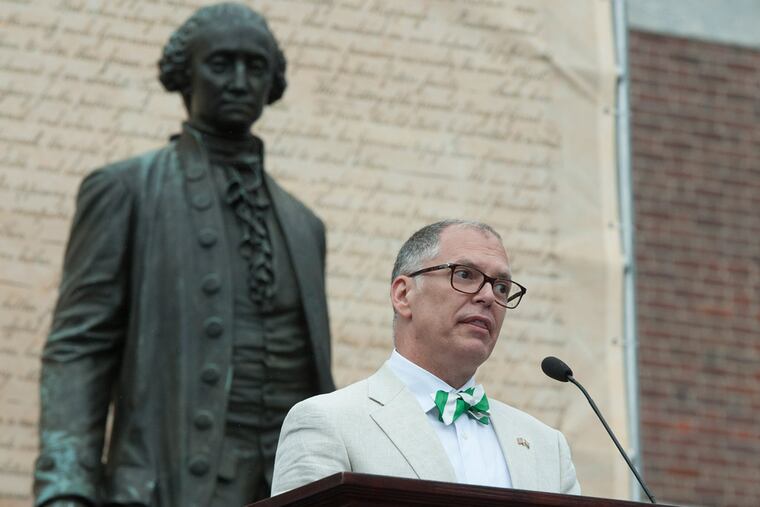This Fourth was truly a day to celebrate freedom
A vocal duo's flawless a cappella rendition of "Over the Rainbow" hushed the crowd outside Independence Hall as the reenactment of a pioneering LGBT civil rights demonstration began.

A vocal duo's flawless a cappella rendition of "Over the Rainbow" hushed the crowd outside Independence Hall as the reenactment of a pioneering LGBT civil rights demonstration began.
Several dozen people marched along Chestnut Street holding placards ("Equality for Homosexual Citizens") that replicated those carried by a plucky group of gay men and lesbians a half-century earlier.
It was an emotional, and pitch-perfect, way to celebrate the Fourth of July - and the fact that marriage equality is at last the law of the land.
Such a thing would have seemed unimaginable at the original demonstration on July 4, 1965, when judicial disdain, job discrimination, and closeted silence were the norm for LGBT people.
"Think what it meant for those gay pioneers to start a civil rights movement when society perceived us as mentally ill," James Obergefell, an Ohio real estate broker, told the crowd Saturday.
Obergefell was the lead plaintiff in the U.S. Supreme Court case that ended with a 5-4 ruling in favor of nationwide marriage equality on June 26.
"It was a landmark day," said Obergefell, who received a standing ovation. "But we need to remember who came before us . . . and the sacrifices they made."
The Independence Hall event was hosted by Equality Forum, a Philadelphia LGBT advocacy and educational organization.
The demonstrators of 1965 "stepped forward on our behalf . . . and changed the course of history," noted Malcolm Lazin, Equality Forum's founder and executive director.
"It was a moment in time when . . . if you came out of the closet, you could lose your job," said Lazin, noting that even private, consensual, same-sex intimacy could be grounds for arrest in 1965.
Saturday's gathering capped several days of events, including an exhibit continuing through January 2016 at the National Constitution Center, to commemorate Philadelphia's landmark demonstration.
That first protest in 1965 and those that followed every July Fourth until 1969 - outside what was then the home of the Liberty Bell - were milestones in gay liberation's evolution from media curiosity to mass movement.
The marchers of 1965, led by activists Frank Kameny and Barbara Gittings, "framed their argument around full equality and full citizenship," Christopher Bartlett, executive director of Philadelphia's William Way LGBT Community Center, said in an interview.
"It was remarkable how prescient they were."
Bartlett's organization has mounted the powerful Speaking Out for Equality exhibit at the Constitution Center. On Friday, LGBT activists, historians, and authors toured the exhibit before participating in a panel discussion.
"The Supreme Court's decision didn't come out of nowhere," Evan Wolfson, founder of the Freedom to Marry campaign, told me. "Gay people have been seeking the right to marry since the dawn of the modern movement. And the movement was not a random series of actions."
Among the trailblazing seekers were Diane Marini and Marilyn Maneely, two Camden County plaintiffs in a marriage equality case that reached the New Jersey Supreme Court in 2002 but fell short of victory.
"In the eyes of the government, I was no one to Marilyn," Marini, 62, said Sunday from her home in Collingswood, where she runs a construction firm.
Her life partner of 15 years died of Lou Gehrig's disease in 2005; the U.S. Supreme Court's ruling came "13 years to the day since we filed our lawsuit," Marini said.
"Now everyone can marry and celebrate two lives becoming one," she added. "Marilyn and I couldn't have that, but that's life. Now, if you want to marry, you can."
The reason the movement for LGBT equality "moved so far so fast," said Randy Wicker, a participant in those pioneering Philly marches, "is that people discovered they had friends and coworkers and family members" who were gay.
"Conversations changed social attitudes," added Wicker, 77, of Hoboken, N.J.
Although the LGBT community "needed a movement to bring us to this moment," Wolfson also cited the personal coming-out decisions of individual citizens.
"There were millions of private acts of courage," he said.
And a very public act of courage by 40 men and women on July 4, 1965, in front of the building where the Declaration of Independence and the Constitution were born.